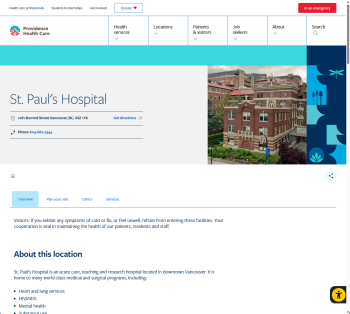St. Paul's Hospital
St. Paul’s Hospital is an acute care, teaching and research hospital located at 1081 Burrard Street, downtown Vancouver. It operates 24/7 with an Emergency Department always open. The hospital offers world-class programs across heart and lung, kidney care, HIV/AIDS, mental health, substance use, surgical specialties, digestive health, pregnancy, birthing and newborn care, as well as seniors’ care and healthy aging. It serves both the local urban community and patients from across British Columbia and the Yukon. patient volumes exceed 380,000 per year.
Facilities & Specialized Services
St. Paul’s includes highly specialized services such as advanced heart and lung surgery, kidney disease treatment, HIV/AIDS primary care, and strong mental health & addiction services. Outpatient & surgical clinics handle many subspecialties; its laboratory and diagnostic imaging support this work. Teaching and research are core functions, with affiliation to the University of British Columbia. Patients can access supports for healthy aging and elder care.
Redevelopment & New Campus
A major redevelopment is underway: the new St. Paul’s Hospital and health campus at the Jim Pattison Medical Campus is expected to open in 2027. The new facility will replace the current Burrard Street site, expand bed capacity, include updated emergency, surgical, critical care, obstetric/newborn units, and integrated outpatient, mental health and addiction treatment, and community services.
Patient Experience & Support
Visiting is open — families as defined by patient are welcome at all times, though subject to clinical/unit needs. The hospital requests visitors avoid using scented products. Language and cultural sensitivity are emphasized. Access to transportation, drop-off & parking, laboratory and diagnostic services is available. For those needing mental health or substance use support there is a HUB unit next to the ED for rapid assessment and stabilization.
What Users Should Know
Because of its teaching and research mandate, wait times for certain specialized services may be longer and referrals often required. When the new campus opens, most existing services will move there; among them emergency, addiction, surgical, mental health. Meanwhile construction and site transitions may cause logistical disruptions. Care is assured round-the-clock via the ED, but for issues outside scope or urgent but non-life-threatening cases, other clinics may be faster.

